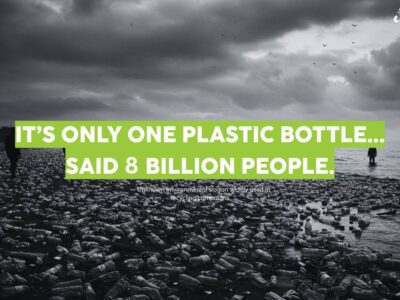Garbage In, Garbage Out, Garbage Everywhere
The collapse of international plastics negotiations demands a new, non-UN framework
 Given all the garbage that we have to deal with nowadays, you might have missed the prospect of actual, non-metaphorical garbage this week: to virtually no one’s surprise, UN negotiations over an international plastics treaty collapsed this week.
Given all the garbage that we have to deal with nowadays, you might have missed the prospect of actual, non-metaphorical garbage this week: to virtually no one’s surprise, UN negotiations over an international plastics treaty collapsed this week.
It’s easy to make jokes referencing The Graduate – and in fact I will – but this is no laughing matter. The Organization for Economic Cooperation and Development estimates that, without global action to curb plastic pollution, plastic production between 2020 and 2040 will grow by 70 percent to 736 million tons. A study in Nature found that anthropogenic mass exceeds all of the Earth’s biomass – and that was five years ago. And that does not even include the potentially devastating health problems caused by plastics and microplastics, although our knowledge of these pathways and their significance is still primitive.
So why did the treaty negotiations collapse? It will not surprise you that petrochemical producing nations, led by Saudi Arabia and the UAE, fought any production restrictions, and they were backed by the Trump Administration, whose policies in this area are now being run by fossil fuel producers and plastics manufacturers. (The Biden Administration had backed a broader treaty, a fact dismissed by those who says that Both Parties Are The Same).
What to do? In Science, Peter Dauvergne of the University of British Columbia and Jen Iris Allan of of Cardiff University argue that it’s time to scrap (so to speak) the UN process altogether:
A coalition of willing states can, and should, quickly launch an alternative negotiating process for the global plastics treaty. World leaders will be attending the UN climate summit in Belém, Brazil, in November 2025. An invitation-only, small-group gathering on the sidelines could generate political will to initiate new talks. From there, environment ministers and negotiators could move forward to work on the broader parameters and finer details, respectively. Ministers and negotiators from more ambitious countries are already in regular contact and understand each other’s positions. This bodes well for the mutual trust and understanding that successful talks require and that are lacking at the UN-convened negotiations….
Treaties can raise global standards without full state participation, as the literature in global governance confirms. Development banks, investors, and certification bodies may rely on agreements like the Rotterdam Convention to evaluate the risks and safety of chemicals and pesticides. Subnational jurisdictions may pursue treaty goals even when their national government rejects them, as Hawaii and California have done since the US first withdrew from the Paris Agreement. In countries that opt out, treaties can motivate municipalities, civil society groups, and scientific organizations to assume environmental leadership. Treaties without full participation can signal to corporations the need to improve their practices to access markets, reassure shareholders, and retain customers.
It’s hard to disagree, really. Certainly over the next three years the United States will block any progress, and the Saudis will as well. So instead of smashing our heads against the wall with a process bound to fail, it is better to go to Plans B and C and D if necessary. It is “not ideal,” say the authors, and that is putting it mildly. But there is little other choice.
The authors’ contention that “[t]reaties can raise global standards without full state participation, as the literature in global governance confirms” is quite compressed, and we should not oversell it, but there is something there. Let’s…uh…unpack this a little.
Suppose that the “high-ambition” nations – which total about 70 nations (with some strange members) – write their own treaty with their own commitments. Those commitments might include border adjustment measures regarding products from polluting countries, similar to border carbon adjustments. They might also include standards for future plastics production, very much including how it could be phased out. That could begin to have broader impacts.
Consider California, which Dauvergne and Allan point to as a potential sub-national partner. After years of trying, state Senator Ben Allen finally got a bill, SB 54, to regulate single-use plastics through the legislature and signed by the Governor. But it kicked the can down the road, essentially delegating a large part of the hard work to CalRecycle, and now, Allen, as well as other advocates, are complaining that proposed regulations are not doing enough (and might even contravene the law itself).
If the High-Ambition Coalition actually does come up with a treaty, then CalRecycle could piggyback on to them. It could also serve as a useful argument in rulemaking: “we are not alone in this. Internationally, they are moving, so it we can issue tougher rules.” Future legislation could even commit the state to following the treaty in its own regulations. Perhaps most importantly, this process could – could – begin to show that reducing plastics production is technologically and economically feasible. After all, even Canada — which is in many ways a petrostate — has advocated for a strong international treaty.
Yes, yes, I know: this is pollyannish. I don’t want to overstate the challenges here. But you have to start somewhere, and Dauvergne and Allan have a specific idea. In the future, ideas for international governance will have to be less rigid and more…well…plastic.




Reader Comments